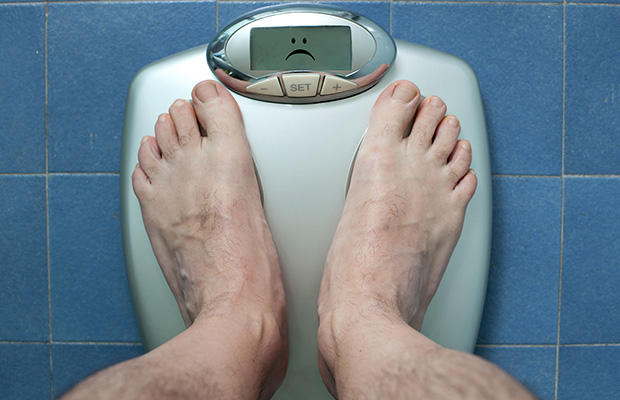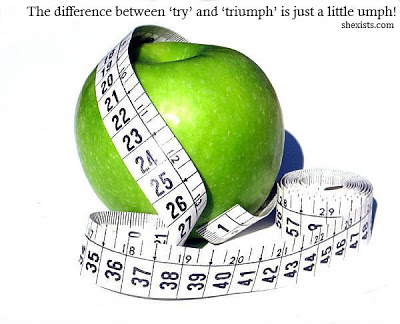With that in mind, take our quiz before you take the leap. By the time you get to the end, you'll have a better idea of whether you're prepared to face the challenges ahead of you. And if you're not, we'll equip you with what you need to do to make sure you're truly good to go.
1. Your last attempt to lose weight was:
 Photograph by Nico De Pasquale Photography/Getty Images
Photograph by Nico De Pasquale Photography/Getty Images
A. A disaster. You couldn't stick with the diet for more than a few days, so you'll never try that plan again.
B. A learning experience. Some things worked and others didn't.
C. A success—at least for a while—so you'll give it another try.
Studies show that most people who lose weight and successfully keep it off are hardly diet novices—they've lost the same 10, 20, or more pounds many times before. What finally turned things around? They learned from their mistakes. "You need to look at past attempts as a learning experience, not a failure," says Timothy Lohman, PhD, a professor of physiology and director of the Center for Physical Activity and Nutrition at the University of Arizona. "Say to yourself, 'I've done this three or four times—what's the pattern here?' If you can see it, then you don't have to repeat it."
If a particular weight loss approach doesn't work for you, there's nothing wrong with starting from scratch. However, think about why the last strategy didn't work and let that guide you. For instance, did you choose a diet that required you to eat foods you don't particularly like while giving up your favorites? Was it impossible to drag yourself out of bed for morning workouts? Consider tossing out whatever tripped you up the last time.
As for the diet that only worked for a while, it probably won't work again because it clearly wasn't one you could stick with over the long haul.
Give yourself 3 points for answering B; 2 points for A; 1 point for C.
2. You want to lose weight to improve your health, but if you're really honest with yourself, your main reason is:
A. You feel like your life is out of control because you're doing things (like eating badly and sitting on the sofa way too much) that you don't want to be doing.
B. You have a wedding, high school reunion, or other big event coming up and want to look great.
C. Someone—your spouse, your mother, or an acquaintance—made a remark about your weight and you feel mortally embarrassed.
Trying to lose weight to gain someone else's approval rarely leads to success. But doing it because you want to feel in control of your life often does. Each time you turn down a piece of chocolate cake or step on the treadmill, you are taking control of your life, and that continual stream of positive reinforcement will help you stay motivated over time. That's what Diane Berry, PhD, a researcher at the Yale University School of Nursing, found in a small but telling study. Berry interviewed 20 women, ages 33 to 82, who had lost an average of 52 pounds and kept it off for 7 years (two participants who were unable to maintain weight loss were also included in the study). Berry found that the feeling of regaining control of their lives through exercise and learning new skills such as portion control gave the women who were successful a sense of empowerment that helped them stay the course to long-term weight loss.
That doesn't mean that you should never try to lose weight to look great for a high school reunion, says Lohman. Meeting a short-term goal often can give you the incentive you need to keep going.
Give yourself 3 points for answering A; 2 points for B; 1 point for C.
3. Before you start your diet, you plan to:
A. Keep doing what you've been doing—eating too much and exercising too little.
B. Get rid of the junk food in your cupboards and refrigerator.
C. Have one last blowout with all of your favorite foods.
Cleaning out your kitchen does reduce temptation. But the chips in your cupboard and the Häagen-Dazs in your freezer aren't the only things that can trip you up. A much better way to prepare is to go about life as usual and document it for a week or so: Keep a food diary, chart the events and emotions that lead you to eat, and log your workouts—even wear a pedometer to see how much incidental activity you get each day. You'll learn what triggers you to overeat and the shortcuts you're taking to cheat yourself on physical activity. Once you do that, have one last blowout if you must. Just don't fool yourself into thinking that treating yourself to a gastronomic swan song is all you need to do to prepare. (Here's what happens to your body when you binge.)
Give yourself 3 points for answering A; 2 points for B; 1 point for C.
4. Your boiled-down version of what it takes to lose weight is:
A. Eat a lot less and exercise a lot more.
B. Cut out sweets, exercise an hour a day, and stick to steamed vegetables and lean proteins for dinner and salads for lunch.
C. Change how you think about yourself.
Most people will need to eat less and exercise more. (Learn the 8 most effective exercises for weight loss.) But it's more important to be willing to change the behaviors and thought patterns that set you up for failure. If you think you're going to fail, then you will be more likely to do so—it's a self-fulfilling prophecy. "You need to say, 'that's not me' and consistently practice that," says Lohman. For instance, tell yourself, I'm the kind of person who can turn down food in social situations and who enjoys the feeling I get from exercising. You know that woman: Fresh from her gym workout, she orders the healthy meal while everyone else is downing chips and margaritas. From here on, that's going to be you.
But you don't need to adhere to a rigid set of rules. Though many stock weight loss rules have merit, you'll be breaking them left and right unless they work in the context of your life. "You might start out by saying, 'I'm going to go to the gym six times a week,' when the reality of your home and work life makes that impossible," says Martin Binks, PhD, director of behavioral health at the Duke Diet & Fitness Center. It's important to be flexible, so hit the gym three times a week and walk with friends the other three days, for example, if you want to make the new you the real you.
Give yourself 3 points for answering C; 2 points for A; 1 point for B.
5. Sometimes you just can't help yourself and you binge on a box of cookies or a pint of ice cream. The reason is:
 Photograph by Brainsil/Getty Images
Photograph by Brainsil/Getty Images
A. Certain emotions or events in your life trigger your binges.
B. You love sweets and have no willpower.
C. You don't know.
"When you're angry, what else could you do besides eat?" asks Lohman. "Or when you're bored, fearful, or tense? It's a good idea to make a list of options. It could be journaling, calling a friend, reading a book, taking a walk, pounding a pillow, or nurturing yourself in other, nonfood ways."
Give yourself 3 points for answering A; 2 points for C; 1 point for B.
6. You'll overcome the time barriers to exercise by:
A. Not even trying. There is simply no wiggle room in your schedule, so you'll just focus on your diet.
B. Breaking up workouts into short segments throughout the day.
C. Carving out a half hour to an hour a day for yourself without fail.
Figure out how to fit exercise into your day. Your success may depend on it. In an 18-month University of Pittsburgh study that tracked 104 women ages 25 to 45, Jakicic found that those who combined diet with physical activity lost more weight than the women who tried to drop pounds using either alone. What's more, exercising seemed to help the women in the study stick to their diets—as their activity level went up, their calorie intake went down.
Does it matter if you break it up or do it in one shot? That depends on you. Another study by Jakicic found that 20 to 40 minutes of exercise daily in 10-minute bouts, 5 days a week, helped some women become more steadfast exercisers (while experiencing the same calorie-burning and cardiovascular-improving benefits they would if they did longer workouts). But even Jakicic admits that method isn't for everybody: "For some people, finding three or four 10-minute bouts of time is more of a hassle than finding 30 to 60 minutes."
Determine what works best with your schedule. It sometimes takes creativity, Yale's Berry says. "My daughter would stand with her music and violin at the end of a lane and practice while I swam laps."
Give yourself 3 points for answering C; 2 points for B; 1 point for A.
7. Restaurant food can make or break a diet, so:
A. You'll only go to places that have low-calorie choices.
B. You'll go to your favorite restaurants, but order more healthfully—dressing on the side, fish that's broiled instead of fried, and so on.
C. You'll eat out less often.
Limiting your dining out to restaurants that serve low-calorie meals or ordering food "your way" can be risky. "There are so many hidden calories in restaurant food," notes Jakicic. Veggies are usually tossed with butter (50 calories in 1/2 tablespoon); tomato sauces can be loaded with olive oil (120 calories in 1 tablespoon); and grilled fish may be brushed with fat before cooking. "And when you go to a restaurant, you may be tempted with 'Just try a bite' or 'What about some wine or dessert?'" he adds.
In his research, Jakicic has found that the more people eat out during the week, the harder it is for them to shed pounds. Your best strategy: Limit restaurant meals to no more than one a week. (Or follow these tips for dining out on a diet.)
Give yourself 3 points for answering C; 2 points for A; 1 point for B.
8. Your significant other:
 Photograph by Tetra Images/Getty Images
Photograph by Tetra Images/Getty Images
A. Doesn't involve himself much in the things that you do.
B. Sticks his nose in everything you do.
C. Is easy to talk to and respects your wishes and decisions.
In 2001, Richard Stuart, DSW, a professor emeritus in the department of psychology at the University of Washington and a former Weight Watchers advisor, surveyed 25,000 married women to see how their relationships influenced their attempts to lose weight. To no one's surprise, Stuart found that half the women failed when their spouses weren't supportive. Less expected was his finding that many women succeeded when their spouses stayed completely out of it. The divide was about 50-50. "It just shows that there is no 'correct' way," says Stuart. "Each couple has to negotiate their own terms."
If you need the support of your spouse or kids, ask for it, and be explicit. "Tell them exactly what they can do to help you succeed," says Lohman.
Give yourself 3 points for answering C; 2 points for A or B.
9. Everyone knows that the average woman shouldn't try to whittle her body down to the size of a genetically gifted supermodel. The weight that will make you happy is:
A. The exact same weight that you were back in high school.
B. The weight that lowers all the predictors of disease—such as cholesterol and blood pressure—to a healthy level.
C. OK, not supermodel skinny, but low enough to be considered very thin.
This is a trick question because all the answers could be right. Common wisdom is that "dreaming big" about getting small leads to failure; in fact, some research shows that women who have modest goals end up taking off more pounds than women with loftier expectations. But a recent study found a link between having "dream" weight loss goals and successfully shedding pounds. Researchers at the University of Minnesota School of Public Health found that women with an unrealistic goal—to lose 30% of their body weight—lost significantly more weight after 18 months than women with less lofty goals. Though they didn't actually hit their dream weight, they felt inspired to keep going because they were confident they could stick to an eating plan and had relatively high self-esteem—all predictors of weight loss success.
While there may be no "correct" goal for everyone, there are correct attitudes, says Jennifer Linde, PhD, lead author of the study. "It's OK to believe that you can lose a lot of weight as long as you're prepared to put in the time and effort it takes to change what you eat and get enough exercise each day."
Give yourself 3 points for answering A, B, or C.
10. Your boss just threw an extra project into your lap or your kids all have big games coming up—in other words, a wrench has been thrown into your workout schedule. You:
A. Give up on it. You'll start again when everything calms down.
B. Get up at the crack of dawn so you can get your workout in.
C. Just do more "incidental" activity, such as taking the stairs and parking farther from your destination.
It might be easier to lose weight if your life were regimented, but let's face it: Stuff happens. "That's why it's so important to have a contingency plan in place for those tough weeks," says Binks. Instead of giving up until the problem passes, try to figure out a way to continue. For example, you could go to bed an hour earlier in order to get up earlier for your morning walk. If that doesn't work, set a reduced goal (such as getting more incidental exercise). But don't get too comfortable with a trimmed-back workout. It's just a temporary solution. Get back to your original activity goal ASAP.
Give yourself 3 points for answering B; 2 points for C; 1 point for A.
MORE: Walk Off 5 Times More Belly Fat
Your Score
30 to 26 points
Ready, set, go. You're prepared to change not just how much you eat and exercise, but also your daily patterns. Most important, you know how to fit these changes into your life. You've taken into consideration your job, your family, and your other commitments—as well as the ups and downs of life—and have made a workable plan to achieve your goals. Keep in mind that you don't have to change everything at once. "Look for things that are the easiest for you to change and that will give you the most benefit; then add in other changes as you go," advises Binks. (Try these teeny tiny changes to lose weight faster.)
25 to 20 points
Although you're willing to take on many of the challenges of weight loss, you're not all the way there. To better prepare, develop some strategies to deal with the inevitable hurdles. How can you find time to exercise when, for instance, your schedule changes because your kids are out of school or it's too dark to walk at night (or walking is painful)? What can you use instead of food to deal with stress or disappointments? How can you avoid overindulging in your favorite foods? Have some support in place before you get started, whether it's friends, family, or an organized support group. "This is especially important for physical activity," says Lohman. "If you have someone to meet and hike or walk with, it can make a big difference."
Below 20 points
You know what it takes to lose weight, but not to keep the weight off. You need to start planning—what you're going to be eating, when you're going to be exercising, who you're going to turn to for help when your resolve is low. To help you set an agenda, revisit other times you've tried to lose weight (or if it's your first time, look critically at your life to see why you're overweight in the first place). Look at the barriers you've faced and how you responded to them.
How did you handle family meals? Were you able to eat lightly or did the pressure from your family make you pile your plate too high? Why did you stop going to the gym even after paying for a membership? Did you hate the place or the exercise you were doing? Was it too hard to get there on time for classes? In the long run, losing weight—and keeping it off—is about creating a lifestyle you can maintain for the rest of your life.
If you aren't sure what's tripping you up, consider talking to a professional, such as a psychologist or nutritionist or, if your downfall is exercise related, a fitness trainer. Once you know the obstacles you're likely to face, you can develop a game plan for success. Losing weight is never easy, but you can help yourself succeed at it if you do some of the work ahead of time.




